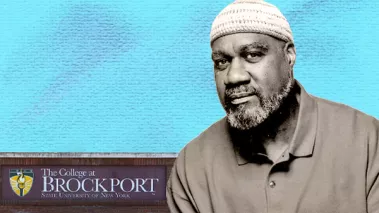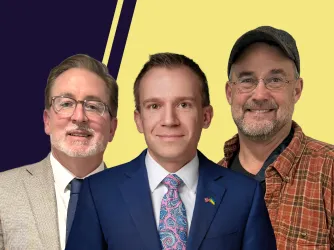Table of Contents
Bad move: SUNY Brockport caves, sends in-person event online after pressure from elected officials and public criticism

Jalil Muntaqim, formerly known as Anthony Bottom, was convicted of killing two police officers in the 1970s. Muntaquim was invited by a SUNY faculty member to speak about his stint as a Black Panther. (Jalil Muntaqim / Facebook.com)
In a disappointing departure from its initial promise to uphold its First Amendment obligations, SUNY Brockport announced yesterday that a planned in-person event featuring controversial speaker Jalil Muntaquim will now take place online. The move comes amid pressure from faculty, elected officials, and pro-police protesters to disinvite the former Black Panther who was convicted of killing two police officers in the 1970s.
Muntaquim, formerly known as Anthony Bottom, was invited by a SUNY faculty member to speak about his stint as a Black Panther and serving as a “political prisoner,” according to the university’s events page.
In the past week, the invitation provoked criticism from numerous elected officials as well as the resignation of a former chief of the Brockport Police Department turned SUNY Brockport professor. Prior to the public outcry, the event was funded by the university’s Promoting Excellence in Diversity Grant, but after extensive media coverage, the grant committee defunded Muntaquim’s appearance. According to the university, an anonymous donor will now fund the appearance.
FIRE wrote to SUNY Brockport on March 17, objecting to the university’s decision to defund the event. Doing so, we wrote, violates the university’s First Amendment obligations. Although we requested a response by March 21, the university has yet to respond.
SUNY Brockport has co-opted a faculty-invited speaker’s appearance by moving it to a virtual format.
Yesterday, the university announced the event would move online to “help mitigate any potential security concerns.” Although the university did not share what threats — if any — have occurred or what security concerns were identified, the statement said, “This event has elicited strong feedback, divergent opinions, and has already spurred protests.”
Although SUNY Brockport has not canceled Muntaquim’s appearance, its decisions to defund the event and move it online still violate First Amendment principles that bind the university.
The university is obligated to provide adequate security for expressive events that may lead to violence or controversy. Instead, it appears SUNY Brockport has co-opted a faculty-invited speaker’s appearance by moving it to a virtual format.
SUNY Brockport says it “believes in freedom of speech and wants to continue to encourage the willingness of the community to engage in critical and respectful dialogue.” However, its decision to move the event online does not advance these goals. Virtual events inherently do not allow for the same engagement and discourse as in-person events, impeding the ability for respectful dialogue to occur, for example.
In cases like this where there is controversy tied to the speaker’s appearance, it is even more important for the event to occur in-person, as there should be room for robust debate and attention to tough questions.
This is a classic example of a heckler’s veto — the university capitulating to detractors’ demands rather than defending expressive rights, which it is required, by law, to do as a public institution. We saw a similar situation at Dartmouth earlier this year, when the administration moved an event online due to unspecified safety concerns.
As before, in addition to writing to the university regarding its obligations to expressive rights, FIRE submitted a public records request to SUNY Brockport asking for more information about the security concerns that led to the event being moved online, as well as for information about why the event was defunded. By seeing actual communications and documents about the situation, we hope to gain clarity regarding whether the university’s justification for moving the event online passes constitutional muster.
We look forward to learning more, and will keep readers updated.
FIRE defends the rights of students and faculty members — no matter their views — at public and private universities and colleges in the United States. If you are a student or a faculty member facing investigation or punishment for your speech, submit your case to FIRE today. If you’re faculty member at a public college or university, call the Faculty Legal Defense Fund 24-hour hotline at 254-500-FLDF (3533). If you’re a college journalist facing censorship or a media law question, call the Student Press Freedom Initiative 24-hour hotline at 717-734-SPFI (7734).
Recent Articles
Get the latest free speech news and analysis from FIRE.

Free speech in Trump 2.0
Podcast

The Federal Bureau of Investigation (of protected speech)

The paper was her lifeboat — UMD called it interference
